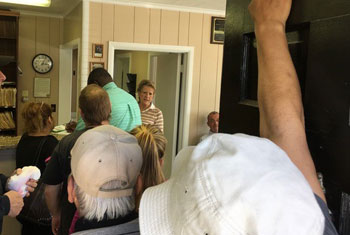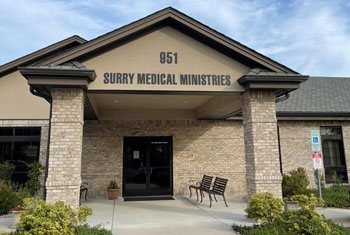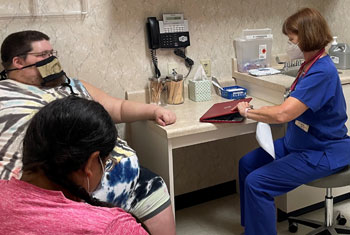Menu

NOVEMBER 2022

I read a story in The New York Times recently that ran under the headline: “Medical Care Alone Won’t Halt the Spread of Diabetes, Scientists Say.”
The story went on to conclude that the only hope for solving our national diabetes epidemic is to tackle the underlying social, economic and environmental drivers that have led to the rising incidence of Type 2 diabetes over the past several decades, particularly among low-income, underserved communities.
This is not exactly news to North Carolina’s free and charitable clinics. It’s because social determinants of health like access to health care and healthy foods stack the deck against our patients that diabetes care and management is a major focus of the services we deliver every day.
Statewide, at 12.4% among adults, the incidence of Type II diabetes in North Carolina exceeds the national average of 11.3%. The situation is even more dire in Eastern North Carolina, where 14.4% of adults have Type 2 diabetes and mortality rates are more than 50% higher than the rest of the U.S.
Those numbers, while high, don’t begin to approach the magnitude of the diabetes scourge among the low-income, uninsured North Carolinians served by free and charitable clinics. It’s not uncommon for clinics to have 40% or more of their total patient caseload managing this chronic disease.
As we begin National Diabetes Awareness Month today, I’m reminded of the vital role played by several of our community partners in helping clinics meet this health care challenge. Together, we are moving the needle for patients managing diabetes with some innovative initiatives and regular ongoing care.
Two of our members, Community Care Clinic of Dare in Nags Head and Albemarle Hospital Foundation Community Care Clinic in Elizabeth City, this year piloted the Fresh Start program created by East Carolina University nutrition expert Lauren Sastre. Both clinics have seen patients’ A1c levels decline.
Fresh Start, funded by a $365,000 grant from The Duke Endowment, provides individual diabetes management coaching, fresh foods and group cooking and physical activity sessions. The program will add three more clinics in 2023, and Lauren also is leading our association’s food insecurity roundtable.

Surry Medical Ministries Clinic in Mount Airy, supported by a health disparities grant from Blue Cross NC and the NCAFCC, significantly expanded outreach to underserved communities over the past year. Regular, more frequent contact with diabetic patients has resulted in lower blood-sugar levels.
Community Care Clinic of Dare focused its health disparities grant on a sample group of 90 Latinx diabetes patients, promoting nutrition through its food pharmacy program and better informing them about the COVID-19 vaccine and the higher risks from the virus faced by diabetes patients.
Thanks to a $50,000 donation from the North Carolina Medical Society Alliance, 15 of our clinics were able to boost point-of-care testing for A1c levels. As anyone who has managed a free and charitable clinic day to day knows, the kind of support NCMSA has provided is vital to the success of our mission.
And there’s Sugar Check Charity, founded in 2019 by Mount Airy’s Bill Rierson. Now 15, Bill learned about our clinics and diabetes at an early age and began volunteering and doing odd jobs for neighbors to raise money. His charity’s mission is to support clinic diabetes care and management efforts.
This year, Sugar Check Charity will donate more than $15,000 to several of our member clinics in the form of financial donations and donated monitors, test strips and diabetic circulatory socks. The nonprofit has delivered more than $30,000 in diabetic supplies to our clinics over the past three years.
The support NCAFCC member clinics received from the North Carolina General Assembly over the past two years helped clinics expand the use of telehealth when clinic visits were risky and hire paid staff to continue delivering care when our volunteer ranks thinned during the pandemic.
Of course, every one of our member clinics and the NCAFCC rely on a network of foundations, individual donors and others who support us day in and day out in our quest to make sure that all North Carolinians have access to high-quality health care regardless of ability to pay.
To Blue Cross NC, ECU and The Duke Endowment, the North Carolina Medical Society Alliance, Sugar Check Charity, the N.C. General Assembly and all of our supporters, we are grateful.
Thank you!
April Cook
Chief Executive Officer
When Surry Medical Ministries Clinic celebrates its 30th anniversary next year, Nancy Dixon and her colleagues and community partners will have plenty of room to party.
The Mount Airy clinic, which serves Surry County and surrounding areas, nearly quadrupled its space in late August when it moved into a 9,500 square-foot building just a few blocks away from the building it had called home since opening its doors in October 1993.
At less than 2,500 square feet, the old location had been bursting at the seams for years as it added new patients and expanded services and hours of operation – from six hours a week to 21 starting in February. During COVID, the clinic also expanded from walk-ins only to seeing patients by appointment.
But the search for larger quarters took a full five years because Nancy, the clinic’s executive director, was holding out for a location that – like the clinic’s original home – was close to Northern Hospital, the clinic’s primary health-care partner.
“They do all of our diagnostics, all of our imaging, and we do the transitional care for them – people coming out of the emergency room, people being discharged, we do all of that transitional care,” Nancy said. “And when people come out of there and they’re uninsured, they come across the street with their prescriptions and get them filled at our pharmacy. So being very far away from the hospital really wasn’t an option.”
The long wait paid off in January when Glenn Pfitzner, a physician with offices right across the street from the hospital, decided to put the building up for sale because of an injury that prevented him from working.
“Glenn came up here right in the middle of clinic one day and said, ‘I think this building would be perfect for you’,” said Nancy, who admits she wasn’t convinced at first. “I finally went down to look at it and it was perfect.”
For the project, the clinic obtained a $2.7 million, 2.5% loan and a $500,000 grant from the U.S. Department of Agriculture and has raised an additional $2 million in grants and local support, including $750,000 from the N.C. State Employees Credit Union, N.C. Rep. Sarah Stevens helped secure $700,000 from the N.C. General Assembly, and $250,000 from Surry County Commissioners. The clinic closed on the purchase Aug. 15 and opened to serve patients Aug. 22.
The clinic is raising an additional $1 million for renovations that will create an expanded pharmacy space, on-site lab for blood draws, vaccinations, urinalyses, point-of-care testing and other basic diagnostics and drive-through access for pharmacy. The clinic parking lot will be doubled in size to accommodate staff and the ever-increasing numbers of patients receiving care at each clinic.
Two procedural suites at the rear of the new clinic are being converted to a dental suite and a lab, although the future lab space is now serving as the clinic’s pharmacy. The new location has room for up to 9 exam rooms – 11 if the clinic decided to move dental off-site.



The clinic now has room for services it has added in recent years, including occupational and physical therapy, diabetes life management classes, group support sessions and expanded behavioral health services. In the old location, the clinic’s therapist had to see patients with anxiety in the dental suite.
The dental suite sports two new dental chairs and one that made the move from the old location. Two old chairs, now retired, were thirdhand by the time they were donated to Surry Medical Ministries, something many free clinics can identify with, Nancy said.
“We passed them on to somebody else, who I think is using them in a haunted trail, which is appropriate,” Nancy laughed.
Surry Medical Ministries Clinic reported a unique patient count of 1,285 as of the end of the state’s reporting fiscal year June 30 and has added 255 new patients since July 1. Nancy credits the influx to a successful outreach effort over the past year by a team of community health workers funded by a health disparities grant from the North Carolina Association of Free and Charitable Clinics and Blue Cross NC.
Demand for the clinic’s services is growing rapidly from uninsured residents of Surry County and parts of surrounding counties. In Surry County alone, 40% of the population is at or below 200% of the federal poverty level – mostly low-wage workers struggling to make ends meet.
“A good number of those people work,” Nancy said. “We serve currently almost 200 employers here in town and provide health care for people that work for them and don’t have insurance.”
But the region served by Surry Medical Ministries Clinic also has an unmet need related to the growing number of residents whose incomes are above 200% of the federal poverty level but have inadequate insurance.
“We have a big issue here for people that are underinsured,” Nancy said. “We have people that get their Medicaid and then can’t find a provider or had major medical and can’t pay for their doctor’s visits or their medicines. Medicare patients are coming to us for physical therapy because they’re only allowed a certain number of visits, so they’re coming to us to get that additional care.”
Clinic bylaws currently limit care to the uninsured, but Nancy expects that to change this month when the board votes on a proposal to expand service to low-income residents with Medicaid and Medicare and charge a sliding-scale fee to those with incomes above the limit for free care.
After being 100% volunteer-staffed since 1993, the clinic hired a full-time staff doctor last month – it’s first-ever paid medical provider – to help accommodate the clinic’s growing caseload. Nancy’s husband David is the clinic’s full-time volunteer medical director and also provides full-time direct medical care.
“Our new clinic, the upgrades we’re making, and our growing staff all reflect our mission of providing not just equal access to healthcare but equal access to quality health care and equitable care,” Nancy said. “We are grateful beyond words to all of our community partners who helped make this happen.”
By ALICE BRITT JACKSON
In the last few months, either a capital campaign has just successful wrapped up, or it is in the planning stages for 2023 across our NCAFCC membership. How exciting it is to know that the fund diversification spotlight also includes this extraordinary method of generating revenue to bring donors even closer to our shared health-care mission. Among all fundraising strategies, though, a capital campaign also is perhaps the most challenging to initiate, sustain and close strongly.
Here’s why. A capital campaign generally is characterized by five attributes:
Within fundraising for nonprofits, capital campaigns have been launched to achieve a variety of goals: funding “bricks and mortar” projects like new facilities or additions; seeding an endowment fund, financing a merger of two or more nonprofits, launching a new program initiative, building organizational capacity, or for a capital purchase to expand a mission’s services within a geographic area. Whatever the strategic motivation, the capital campaign is a key tool for promoting the sustainability of your organization and mission and will unite donors, like never before, with a lasting commitment to helping care for the uninsured and underserved in need of access to quality patient care.
What’s really involved in a capital campaign? Where is the expertise to guide planning, execution, and wrap-up? On Oct. 11, 2022, NCAFCC participated in an informative webinar, “Set Your Campaign Up for Success: 3 All Important Pre-campaign Strategies,” released by the Capital Campaign Toolkit to help nonprofits better understand and facilitate a successful capital campaign. NCAFCC has received permission from Capital Campaign Toolkit to share this comprehensive overview with its members. Click on the link, complete contact information, and enter this opportunity to gain more insight into staging a capital campaign. After watching the webinar, find time to explore the Capital Campaign Toolkit website, which further equips nonprofits with the tools and guidance to conduct an extraordinarily successful capital campaign — i.e., a capital campaign checklist, a capital campaign plan, and a variety of capital campaign resources.
Finally, the webinar, “Set Your Campaign Up for Success” featured two of Capital Campaign Toolkit’s experts, who are available to help actualize a capital campaign. Whenever you start thinking about the launch of this comprehensive fundraiser strategy, reach out to your NCAFCC team as well, an ongoing resource for best practices in fund development.
Alice Mae is director of development and health equity for the NCAFCC. Reach her at alicemae@ncafcc.org.